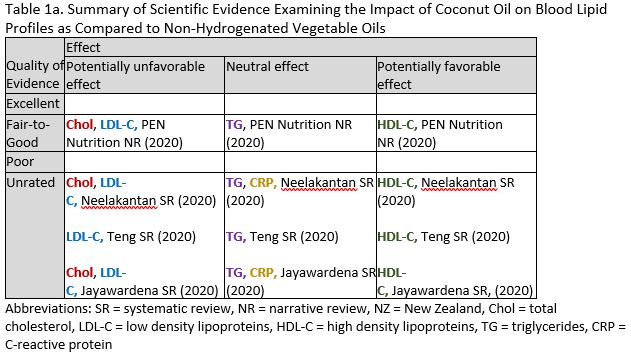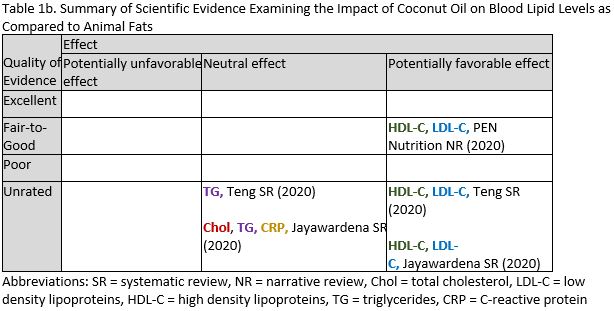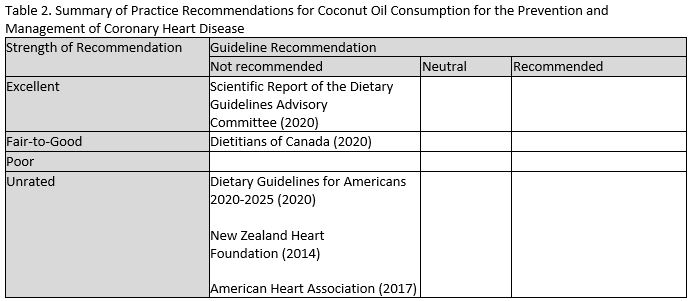Coconut oil is a tropical oil derived from the kernel of mature coconuts and is a white solid at room temperature.1 Coconut oil is composed primarily of saturated fatty acids with only small amounts of monounsaturated and polyunsaturated fatty acids.2 In general, high saturated fat intake is strongly linked to an increased risk of cardiovascular disease.2 However, coconut oil’s unique fatty acid profile with a high amount of the medium chain fatty acid lauric acid may impact cardiovascular disease risk differently than other saturated fat sources.2 Whether coconut oil has beneficial, neutral, or harmful effects on cardiovascular disease has been debated in both the scientific and lay literature. The aim of this review is to compare coconut oil to other types of dietary fats and oils in terms of heart health.
The authors screened nutrition evidence databases and clinical practice guidelines for relevant information using established protocols. The inclusion and exclusion parameters, specific databases, and search strategies for this RKO are available on OSF (OSF Link). This is a review update and new sources have been added to the original search findings. Overall, the search time frames cover Jan 2016 to August 2022 for the systematic reviews, Jan 2020 to August 2022 for the primary literature searches, and Jan 2011 to September 2022 for the clinical practice guidelines. GRADE (Grading of Recommendations Assessment, Development, and Evaluation) is a systematic approach used to review research evidence based on the five factors of risk of bias, imprecision, inconsistency, indirectness, and publication bias. The certainty of evidence is assigned a GRADE of high, moderate, low or very low. Reviewers recorded the quality of evidence as reported by the authors, using the categories defined as follows: “excellent” for high GRADE[1] or strong evidence; “fair-to-good” for moderate GRADE or fair evidence; “poor” for low GRADE, very low GRADE or weak evidence; and “unrated” for quality not evaluated or insufficient evidence to evaluate.
For this review, the population was limited to healthy adults. Scientific evidence or practice guidelines that compared the effects of substituting coconut oil for animal or vegetable oils were included. Outcomes of interest included these coronary heart disease risk factors: low-density lipoprotein cholesterol (LDL-C), high-density lipoprotein cholesterol (HDL-C), total cholesterol, triglycerides (TG), Outcomes also included these coronary heart disease events: incidence, atherosclerosis, heart failure, myocardial infarct, and mortality.
The five systematic and narrative reviews evaluated the effect of coconut oil on coronary heart disease risk factors. Evidence suggests coconut oil unfavorably increases total cholesterol and LDL-C levels when compared to unsaturated vegetable oils.1-4 There is some evidence that extra virgin or virgin coconut oil may not raise LDL-C compared to regular coconut oil, but the information is not sufficient to make any dietary recommendations based on the form of the coconut oil. 2,3 However, coconut oil does not raise LDL-C to the same extent as butter or other animal fats.1,3,4 Evidence showed a favorable increase in HDL-C levels but no effect on TG or levels in comparison to unsaturated vegetable oils and animal fats.1-5 Importantly, the evidence cited here is primarily of unrated quality. There is no evidence on the effect of coconut oil consumption on cardiac events or mortality due to cardiovascular disease. Organizations in the United States, Canada, and New Zealand recommend against the use of coconut oil as an alternative to non-hydrogenated vegetable oils to promote positive lipid profiles.4, 6-12 No recommendations have been made related to the replacement of animal fats with coconut oil. A complete list of outcomes, including the quality of evidence and the strength of the recommendations, is described in Tables 1a, 1b and 2.



In summary, evidence suggests coconut oil detrimentally raises total cholesterol and LDL-C levels and beneficially raises HDL-C levels. The risks, however, outweigh the benefits. Guidelines consistently recommend against substituting coconut oil for unsaturated vegetable oils.
References
- Jayawardena R, Swarnamali H, Lanerolle P, Ranasinghe P. Effect of coconut oil on cardio-metabolic risk: A systematic review and meta-analysis of interventional studies. Diabetes Metab Syndr. 2020;14(6):2007-2020.
- Neelakantan N, Seah JYH, van Dam RM. The effect of coconut oil consumption on cardiovascular risk factors: a systematic review and meta-analysis of clinical trials. Circulation. 2020;141(10):803-814.
- Teng M, Zhao YJ, Khoo AL, Yeo TC, Yong QW, Lim BP. Impact of coconut oil consumption on cardiovascular health: a systematic review and meta-analysis. Nutr Rev. 2020;78(3):249-259.
- Dietitians of Canada. What effect do tropical oils (palm oil and coconut oil) have on blood lipids?. In: Practice-based Evidence in Nutrition ® [PEN]. 2020 July 09. [cited 2021 Mar 04] Available from: https://www.pennutrition.com/KnowledgePathway.aspx?kpid=2878&pqcatid=145&pqid=2946. Access only by subscription. Click Sign Up on PEN login page.
- Neumann HF, Egert S. Impact of Meal Fatty Acid Composition on Postprandial Lipemia in Metabolically Healthy Adults and Individuals with Cardiovascular Disease Risk Factors: A Systematic Review. Adv Nutr. 2022;13(1):193-207.
- U.S. Department of Agriculture and U.S. Department of Health and Human Services. Dietary Guidelines for Americans 2020-2025. 9th Edition. 2020.
- Dietary Guidelines Advisory Committee. Scientific Report of the 2020 Dietary Guidelines Advisory Committee: Advisory Report to the Secretary of Agriculture and the Secretary of Health and Human Services. Washington, DC: US Department of Agriculture; 2020.
- New Zealand Heart Foundation. Coconut oil and the heart - Position statement. 2014. Accessed January 19, 2021. https://www.heartfoundation.org.nz/resources/coconut-and-the-heart-position-statement.
- Sacks FM, Lichtenstein AH, Wu JHY, et al. Dietary Fats and Cardiovascular Disease: A Presidential Advisory From the American Heart Association. Circulation. 2017;136(3):e1-e23.
- Jacobson TA, Ito MK, Maki KC, et al. National lipid association recommendations for patient-centered management of dyslipidemia: part 2--full report. J Clin Lipidol. 2015;9(2):129-169.
- Lichtenstein AH, Appel LJ, Vadiveloo M, et al. 2021 Dietary Guidance to Improve Cardiovascular Health: A Scientific Statement From the American Heart Association. Circulation. 2021;144(23):e472-e487.
- Grundy SM, Stone NJ, Bailey AL, et al. 2018 AHA/ACC/AACVPR/AAPA/ABC/ACPM/ADA/AGS/APhA/ASPC/NLA/PCNA Guideline on the Management of Blood Cholesterol: A Report of the American College of Cardiology/American Heart Association Task Force on Clinical Practice Guidelines. Circulation 2019; 139 (25): e1082-e1143.


.png)





